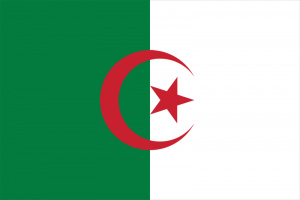Difference between revisions of "Language/Algerian-arabic/Grammar/How-to-Use-Be"
m (Quick edit) |
m (Quick edit) |
||
| Line 1: | Line 1: | ||
{{Algerian-arabic-Page-Top}} | |||
In | <div class="pg_page_title">Algerian Arabic Grammar - How to Use "Be"</div> | ||
Hi [https://polyglotclub.com/language/algerian-arabic Algerian Arabic] learners! 😊<br>In this lesson, we will learn how to use the verb "be" in Algerian Arabic. We will look at the different forms of the verb and how to use them in sentences. __TOC__ | |||
The verb "be" is used to describe a state or condition. It is used to talk about what something is, or what someone is like. In Algerian Arabic, the verb "be" is conjugated differently depending on the subject of the sentence. | |||
The following table shows the conjugation of the verb "be" for different subjects: | |||
{| class="wikitable" | |||
{| class="wikitable | |||
|- | |- | ||
! Subject !! Algerian Arabic !! Pronunciation !! English Translation | |||
|- | |- | ||
| | | I || أنا || ʔana || I am | ||
| | |||
| | |||
| | |||
|- | |- | ||
| | | You (singular) || أنت || ʔanta || You are | ||
| | |||
| | |||
| | |||
|- | |- | ||
| | | He/She/It || هو/هي/إنه || huː/hiː/ʔinhu || He/She/It is | ||
| | |||
| | |||
| | |||
|- | |- | ||
| | | We || نحن || naħnu || We are | ||
| | |||
| | |||
| | |||
|- | |- | ||
| | | You (plural) || أنتم || ʔantum || You are | ||
| | |||
| | |||
| | |||
|- | |- | ||
| They || هم || hum || They are | |||
|They | |||
| | |||
| | |||
| | |||
| | |||
| | |||
|They are | |||
|} | |} | ||
Let's look at some examples of how to use the verb "be" in Algerian Arabic: | |||
* [[Language/Algerian-arabic | |||
* Person 1: انا مشغول (ʔana mišġuːl) (I am busy) | |||
* Person 2: وأنت؟ (waʔanta?) (And you?) | |||
* Person 1: هي طالبة (hiː ṭaːliba) (She is a student) | |||
* Person 2: وهو؟ (wa huː?) (And he?) | |||
* Person 1: نحن سعداء (naħnu saʕdaːʔ) (We are happy) | |||
* Person 2: وأنتم؟ (waʔantum?) (And you?) | |||
* Person 1: هم متعبون (hum mutʕabuːn) (They are tired) | |||
* Person 2: وأنت؟ (waʔanta?) (And you?) | |||
To improve your [[Language/Algerian-arabic|Algerian Arabic]] [[Language/Algerian-arabic/Grammar|Grammar]], you can also use the [https://polyglotclub.com Polyglot Club] website. [https://polyglotclub.com/find-friends.php?search=send&d=0&f=36&offre1=332 Find native speakers] and ask them any [https://polyglotclub.com/language/algerian-arabic/question questions]! | |||
{{#seo: | |||
|title=Algerian Arabic Grammar - How to Use "Be" | |||
|keywords=Algerian Arabic, Grammar, Be, conjugation, sentence, example | |||
|description=In this lesson, we will learn how to use the verb "be" in Algerian Arabic. We will look at the different forms of the verb and how to use them in sentences. | |||
}} | |||
<hr>➡ If you have any questions, please ask them in the comments section below.<br>➡ Feel free to edit this wiki page if you think it can be improved. 😎 | |||
{{Algerian-arabic-Page-Bottom}} | |||
Revision as of 20:41, 28 February 2023
Hi Algerian Arabic learners! 😊
In this lesson, we will learn how to use the verb "be" in Algerian Arabic. We will look at the different forms of the verb and how to use them in sentences.
The verb "be" is used to describe a state or condition. It is used to talk about what something is, or what someone is like. In Algerian Arabic, the verb "be" is conjugated differently depending on the subject of the sentence.
The following table shows the conjugation of the verb "be" for different subjects:
| Subject | Algerian Arabic | Pronunciation | English Translation |
|---|---|---|---|
| I | أنا | ʔana | I am |
| You (singular) | أنت | ʔanta | You are |
| He/She/It | هو/هي/إنه | huː/hiː/ʔinhu | He/She/It is |
| We | نحن | naħnu | We are |
| You (plural) | أنتم | ʔantum | You are |
| They | هم | hum | They are |
Let's look at some examples of how to use the verb "be" in Algerian Arabic:
- Person 1: انا مشغول (ʔana mišġuːl) (I am busy)
- Person 2: وأنت؟ (waʔanta?) (And you?)
- Person 1: هي طالبة (hiː ṭaːliba) (She is a student)
- Person 2: وهو؟ (wa huː?) (And he?)
- Person 1: نحن سعداء (naħnu saʕdaːʔ) (We are happy)
- Person 2: وأنتم؟ (waʔantum?) (And you?)
- Person 1: هم متعبون (hum mutʕabuːn) (They are tired)
- Person 2: وأنت؟ (waʔanta?) (And you?)
To improve your Algerian Arabic Grammar, you can also use the Polyglot Club website. Find native speakers and ask them any questions!
➡ If you have any questions, please ask them in the comments section below.
➡ Feel free to edit this wiki page if you think it can be improved. 😎
